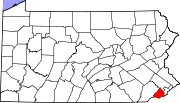Crum Lynne, Pennsylvania | |
|---|---|
| Coordinates: 39°52′20″N75°19′41″W / 39.87222°N 75.32806°W | |
| Country | United States |
| State | Pennsylvania |
| County | Delaware |
| Township | Ridley |
| Elevation | 62 ft (19 m) |
| Time zone | UTC-5 (Eastern (EST)) |
| • Summer (DST) | UTC-4 (EDT) |
| ZIP code | 19022 |
| Area code(s) | 610 and 484 |
| FIPS code | 42-42045 |
| GNIS feature ID | 1203375 [1] |
| Other names | Leiperville Crumlynne |
| [2] | |
Crum Lynne is an unincorporated community in Ridley Township, Delaware County, Pennsylvania, United States.


